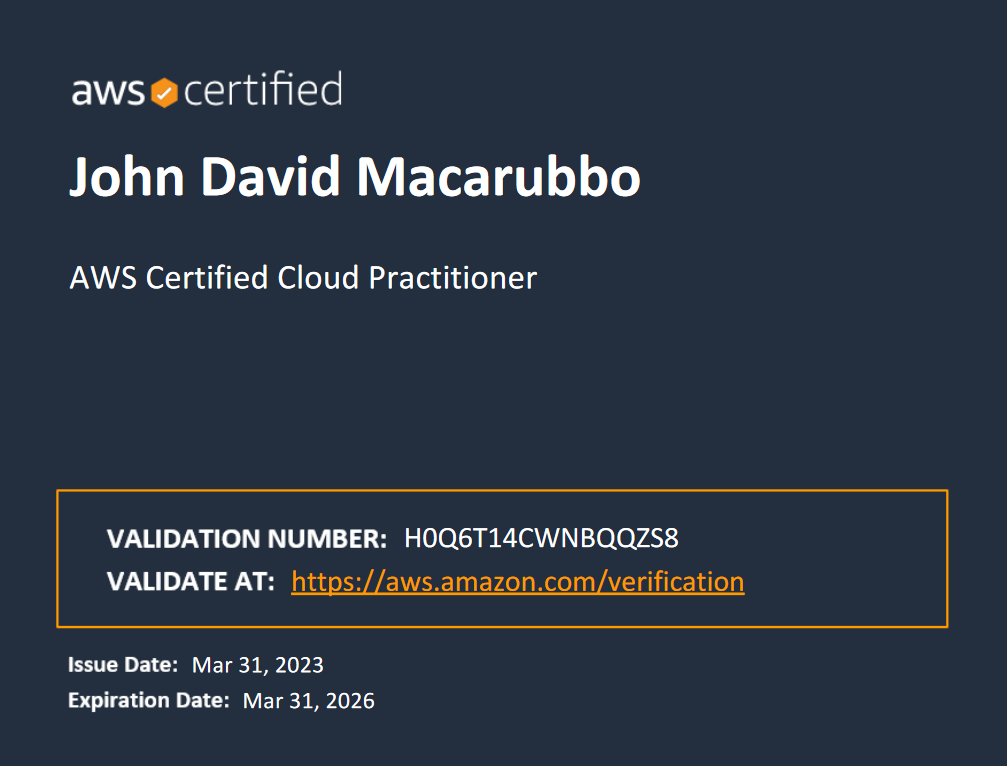How I Passed AWS Certified Cloud Practitioner (CLF-C01)

I recently passed my AWS Certified Cloud Practitioner exam, scoring 889 (out of 1000) on my first attempt. While the ideas are still fresh in my mind, I'd like to share my experience and some of my tips and tricks on how to pass the AWS Certified Cloud Practitioner exam in 2023.
TL;DR
- Read the AWS Certified Cloud Practitioner exam guide to identify the topics to be covered.
- Create an AWS account if you want a hands-on learning experience.
- There are free and paid source materials to help you pass the exam, choose wisely.
- Do mock exams (if applicable), to identify your weak areas.
- Associate keywords to services and concepts.
- Read the AWS Whitepaper before going to the exam.
- Consider reading this AWS terminology cheat sheet to reinforce cloud concepts.
- Read the exam question twice or thrice if necessary.
- Utilize the flag feature if you're unsure of the answer to the exam question.
- Review your answers if you have time.
With the TL;DR out of the way, let's get going.
What are the Odds?
I am confident enough to say that the actual exam isn't that hard, but not too easy as well, as it requires general knowledge of cloud computing concepts, what AWS offers and a high-level overview of how they work, and some of the recommended best practices on how to utilize the cloud.
For somebody who deals with AWS daily, the exam would be relatively easy and only requires a little time to prepare and pass the exam, but people who are new to cloud computing and its concepts need more time to prepare to guarantee a passing score.
Preparation time
To be properly informed of how the exam would look like, I suggest to read the exam guide as it details the topics that will be covered on the exam.
I would also suggest creating your own AWS account as it will give you an overview of what the AWS management console looks like. AWS has been continuously rolling out new user interfaces for each of its services, and some of the video-based tutorials might be outdated with the UI. Another benefit of having an AWS account is the ability to try different services AWS has to offer, just be careful with some of them as they can be expensive.
Picking the Right Source Material/Tutorial
In my preparation for the exam, I used both free and paid resources. In this way, I can ensure that I can cover most of the possible topics for the exam. I used and can recommend the following:
- aws.training - Free and from AWS itself. It provides essential topics for the exam, exam preparedness checks, and mock questions for you to practice with.
- Stephane Maarek's Udemy Course - A paid resource, but on the cheaper side. Comprehensive, has hands-on materials for you to watch and follow, and a mock exam for you to practice with.
- Kesha Williams' A Cloud Guru Course - A paid resource, on the pricier side, but I recommend subscribing to A Cloud Guru if you have plans to take your cloud certification journey further. I find the course fun and engaging; there are visual guides to follow, the explanation is clear and concise, the exam tips secured me some exam points, there are hands-on labs where you can use AWS resources without worrying about the cost and setup, and lastly, there are six (yes, six) mock exams to practice with.
Well, having three of them as source material is probably overkill for a foundational certification, but I did this to compare and see which course content creator should I check out for other courses in the future.
Before the Exam
Look for keywords during your study. Associating a keyword with a service or a concept would help you in identifying the correct answer to the question. For instance, Desktop as a Service (DaaS) refers to Amazon Workspaces, or serverless compute would mean Lambda
A few days before the exam, I would recommend taking several mock exams to know your area of weakness. In my experience, my weak point is around the AWS well-architected framework and its pillars, so I had to review that particular area until I have confidence about the topic.
On the exam day before taking your exam, I would recommend reading the AWS Whitepaper. It is (as of this writing) a 98-page document that details a list of available AWS services and other cloud computing concepts. I secured a point in the exam by reading what Amazon Kendra does on a high level.
Another thing to consider is to read this AWS terminology cheat sheet article. Though it was written in 2018, the content is still relevant up to this day.
Scheduling for the Exam
Experience would vary depending on your choice of how to take the exam (whether going to the test center or taking it remotely). I opted for the remote option. It was easy, and in the comfort of my home office. They have to make sure your exam area follows their guidelines. Also, an arbiter would watch and listen to you during the exam.
During the Exam
Here are some of the tips that helped me during the exam:
- Read the question twice or thrice if necessary - Some of the exam questions are surprisingly tricky. Beware of the questions with not or any word that would negate the whole context of the question, leading you to the incorrect answer. There are also some exam questions with scenarios that aren't relevant to what service/concept the question is looking for.
- Utilize flags - If you are unsure of the question, don't spend too much time on it. The most efficient way to go is to flag it, make a guess, and move to the next question. You can always come back and review flagged questions later.
- If you have time, review all of your answers - In my experience, I had a question where I knew the correct answer, but I misclicked and picked the wrong one. Reviewing my answers helped me ensure a passing score on the exam.
What's Next?
Hopefully, this piece of article helps you pass the exam and get certified as AWS Cloud Practitioner. You can take a break and savor the fruit of your labor. In my case, I went straight away to prepare for AWS Certified Solutions Architect - Associate exam to maintain my momentum and hopefully give me an edge to pass the next certification.
Wish me luck!
